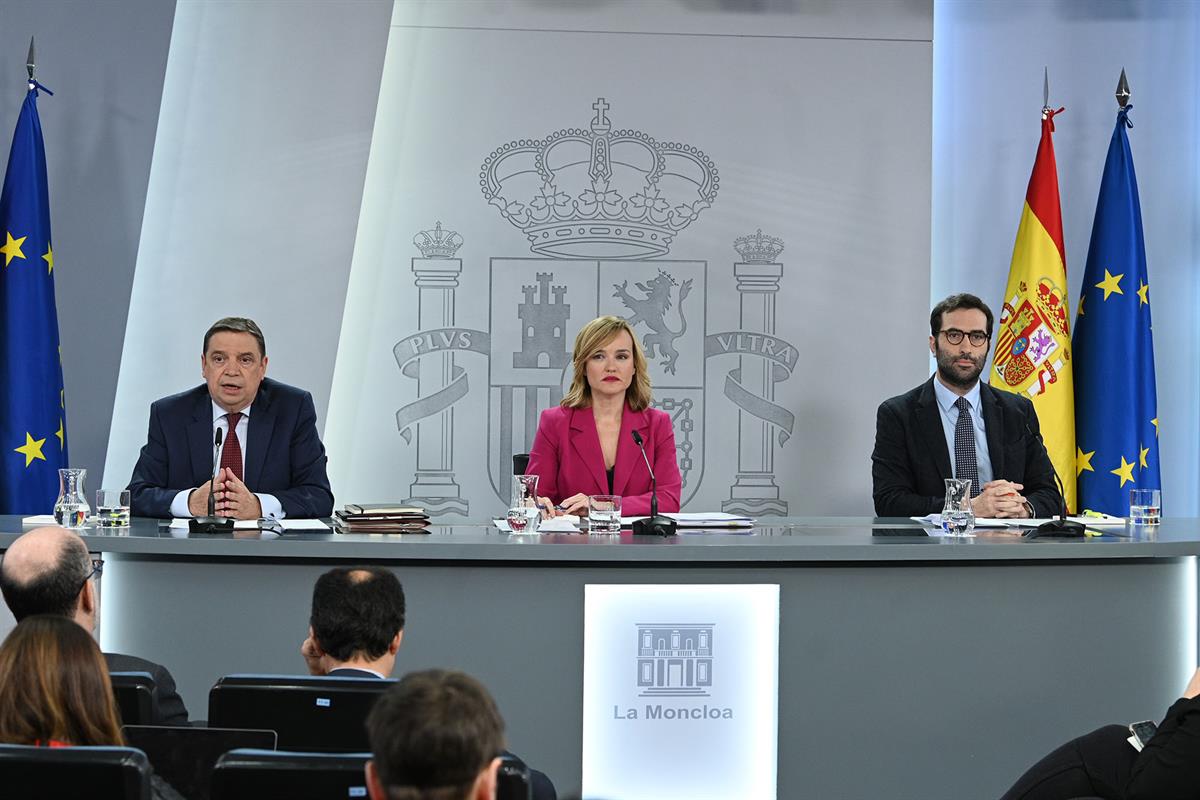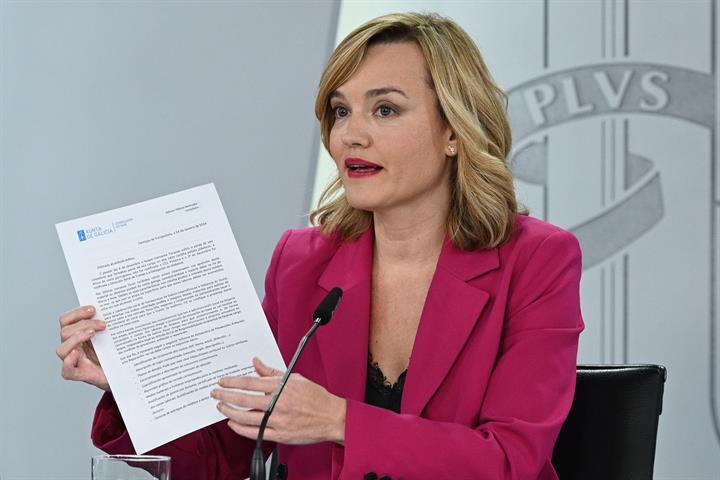Moncloa Palace, Madrid
 The Minister for Agriculture, Fisheries and Food, Luis Planas, the Minister for Education, Vocational Training and Sports, and Government Spokesperson, Pilar Alegría, and the Minister for Economy, Trade and Enterprise, Carlos Cuerpo (Foto: Pool Moncloa/Borja Puig de la Bellacasa)
The Minister for Agriculture, Fisheries and Food, Luis Planas, the Minister for Education, Vocational Training and Sports, and Government Spokesperson, Pilar Alegría, and the Minister for Economy, Trade and Enterprise, Carlos Cuerpo (Foto: Pool Moncloa/Borja Puig de la Bellacasa)
The Council of Ministers has approved the Draft Bill on the Prevention of Food Loss and Food Waste.
The Minister for Agriculture, Fisheries and Food, Luis Planas, recalled that the text already began its passage through parliament during the last legislature, but fell due to the dissolution of the General Courts. The Executive, he added, has taken up the project as soon as possible because of the importance it attaches to this issue.
"I would sum up the content of this law in a very simple and very graphic idea: here, nothing is thrown away", the minister explained. This is a "categorical imperative" that Luis Planas has based on four pillars: economic efficiency, the loss of natural resources, social justice and the ethical component. "We live on a planet where almost 800 million people suffer from hunger or malnutrition," he said.
The Minister for Agriculture pointed out that, according to data from the Food and Agriculture Organisation of the United Nations (FAO), 30% of food produced globally is lost or wasted each year. In the case of Spanish households, waste in 2022 was 1.17 billion kilos or litres, about 65.5 kilos or litres per adult per year. Food waste has reduced compared to pre-pandemic levels, and this draft bill aims to make further progress in that direction, Planas said.
Keys to combating food loss
 The Minister for Agriculture, Fisheries and Food, Luis Planas, during the press conference after the Council of Ministers | Pool Moncloa/Borja Puig de la Bellacasa
The Minister for Agriculture, Fisheries and Food, Luis Planas, during the press conference after the Council of Ministers | Pool Moncloa/Borja Puig de la Bellacasa
The backbone of the regulation is the hierarchy of use: the absolute priority will be human consumption of the food; if this is not possible, it will be used for animal feed or energy purposes.
The law includes an obligation on the part of the producer or distribution sector to donate surplus food that is fit for consumption. Planas, who praised the good distribution practices in this area, detailed that food shops of more than 1,300 square metres will have to have agreements with food banks or non-governmental organisations to donate food that can still be used.
In addition, catering establishments must offer the customer the option of taking away any food or drink not consumed in containers.
Secondly, the bill provides for the processing of certain foods into other products such as creams or jams. If they are no longer fit for human consumption, they will be used - in this order - for animal feed, by-products in other industries or for composting or biofuels.
Education against waste
Luis Planas stressed that the law establishes rights and obligations, "but above all it is an educational law that seeks to inform and prevent food waste", in line with the campaigns that his department has been developing since 2018. "The most expensive food is the food that ends up in the rubbish," he said.
The minister also pointed out that the draft bill addresses other very significant aspects, such as the consumption of products considered aesthetically imperfect, local and seasonal products, organic farming and the obligations of administrations in terms of public procurement.
Planas has expressed the government's desire to "drum up as much parliamentary support as possible" in the process that is now beginning.
Prudent and flexible Treasury financing strategy
 The Minister for Economy, Trade and Enterprise, Carlos Cuerpo, during the press conference after the Council of Ministers | Foto: Pool Moncloa/Borja Puig de la Bellacasa
The Minister for Economy, Trade and Enterprise, Carlos Cuerpo, during the press conference after the Council of Ministers | Foto: Pool Moncloa/Borja Puig de la Bellacasa
The Council of Ministers discussed the financing strategy that the Treasury today presented for 2024, which envisages a reduction of 10 billion euros thanks to solid economic growth and the consolidation of public accounts.
During his appearance at the press conference following the Council, the Minister for Economy, Trade and Enterprise, Carlos Cuerpo, stressed that the strategy "is marked by prudence and flexibility". In his opinion, it is a strategy that puts Spain in a solid position and allows it to "maintain deep market access and a stabilised risk premium", which reflects the high level of investor confidence in our economy.
Carlos Cuerpo highlighted Spain's "excellent economic performance" in 2023, which has allowed it to be one of the main engines of growth in Europe, even in a context of high international uncertainty: "The growth estimate of around 2.4% is well above that of our main partners and even three times the estimate of the euro zone average".
The minister explained that this positive evolution is based on two aspects: the good evolution of the labour market and the robustness of the foreign sector.
In this respect, he stressed that the highest figure of 21 million people affiliated to Social Security has been reached, with specific growth in sectors with a high added value, the quality of work has improved and temporary employment is approaching European levels. Moreover, exports have strengthened and the evolution of the economy's financing capacity is "very positive" in a context of declining and weakening external demand. "This signals a structural improvement in the economy that will allow us to have higher growth rates in the medium term," he predicted.
In this context, the minister reiterated that the Treasury's strategy is "prudent and flexible, capable of adapting to the highly uncertain and potentially changing circumstances in the international environment".
Financing needs
Carlos Cuerpo stressed that the good performance of the Spanish economy and the commitment to fiscal consolidation have allowed the Treasury to reduce the need for new financing in both 2023 and 2024. In 2024, it is expected to stand at 55 billion euros, decreasing by 10 billion euros.
This decrease responds to the government's commitment to reduce the deficit and the debt-to-GDP ratio, which will stand at 106.3% at the end of the year. "From the peak debt we reached at the beginning of the COVID crisis to the beginning of 2021, we have reduced our debt by around 19 percentage points", creating a buffer in case we need to respond to future crises, the minister said.
On the other hand, Carlos Cuerpo has maintained that the Treasury's prudent policy is allowing it to soften the impact of the European Central Bank's interest rate hike and, therefore, contain the cost of debt.
The minister said that the prudent behaviour of the Treasury portfolio allows us to refinance only "a small part of our debt each year. About 12-14% of our total portfolio has to be renewed every year because we have managed to increase the average life. "Compared to a 450 basis point rise in the European Central Bank's official rates, our average cost has risen by just 45 basis points since 2021. That is ten times less," he added.
Cuerpo also highlighted the high confidence of international investors. Non-resident foreign investors increased their holdings of government debt, mainly focused on medium and long-term instruments. Moreover, retail investors' interest in purchasing Letras del Tesoro has increased, given the high yield and security of this product. Thus, this type of investor has increased its holdings in bills to almost 23 billion euros.
The Minister for Economy concluded by pointing out that in 2024 the objective of diversifying the investor base will be maintained and the commitment to the issuance of green bonds will continue, thus strengthening the sustainable finance market in Spain.
Government Delegate Commissions
 The Minister for Education, Vocational Training and Sports, and Government Spokesperson, Pilar Alegría, during her speech at the press conference after the Council of Ministers | Pool Moncloa/Borja Puig de la Bellacasa
The Minister for Education, Vocational Training and Sports, and Government Spokesperson, Pilar Alegría, during her speech at the press conference after the Council of Ministers | Pool Moncloa/Borja Puig de la Bellacasa
The Council of Ministers has approved the Royal Decree establishing the Government Delegate Commissions.
The Minister for Education, Vocational Training and Sports, and Government Spokesperson, Pilar Alegría, has announced that the five commissions will be joined by an Interministerial Commission on Migration, which will be chaired by the Minister of Territorial Policy and Democratic Memory, Ángel Víctor Torres, and will include the Ministries of the Interior; Foreign Affairs, European Union and Cooperation; Inclusion, Social Security and Migration; and Youth and Children.
Honours
The Government has awarded basketball player Ricky Rubio the Gran Cruz de la Real Orden del Mérito Deportivo, which is the highest distinction a sportsperson can receive in our country.
Pilar Alegría highlighted the professional career of the player, who has an "absolutely brilliant track record", as well as his personal and social facet: "He chairs an important foundation that works for the prevention of cancer and to generate the inclusion of people with disabilities in the field of sport and focuses on different activities to raise awareness of mental health".
Non official translation




